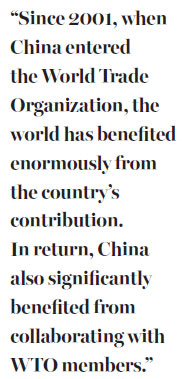Breaking with globalization is ill-advised
Many countries advocating protectionism will suffer the consequences of inertia in economic and social growth structures
China's growth in recent decades is an economic miracle. As it lifted 728 million people above the UN-defined poverty line - contrasting with a mere 152 million in the rest of the world since 1981 - China became the world's second-largest economy, contributing nearly 39 percent to global economic growth. China's economic structure has evolved adaptively, from a central-government-ruled economy to a market-oriented one.
Since 2001, when China entered the World Trade Organization, the world has benefited enormously from the country's contribution. In return, China also significantly benefited from collaborating with WTO members in terms of improving manufacturing efficiency, technology and innovation capability, and in boosting economic power and catching up with the others.
The WTO's basic rule involves mutual trust, non-discriminatory "national treatment" and the concept of globalization, which allows members to freely trade with each other according to need.
But the 2008 economic crisis created long-lasting pain for both developed and developing countries. Taking the most important indexes to evaluate an economy - GDP growth rate and unemployment - many advanced countries have shown weak capability to recover. The weakness is mainly seen in their social-economic structures' ability to sustain growth and well-being. In the post-crisis era, calculating the extent to which China can directly contribute to other countries' economic growth has become the keynote. China is no longer an economic spillover taker but an economic spillover giver.

With China's strong willpower and efforts to sustainably transform its economy from one based on manufacturing and investment to a service- and consumption-orientated model, worries have been growing, especially from those who depend economically on the country's economic growth. Therapies to get over economic fatigue are presented with two options: either follow the globalization concept and obey WTO rules for open collaboration in the long run, or to close the door and advocate de-globalization to protect domestic uncompetitive industries.
The options are not parallel. It is known that de-globalization in a long run will hurt economic sustainability, political stability, and social advances.
The purpose of the WTO is to encourage international trade and facilitate technology and social advances in order to boost each member's comparative advantage. Advanced economies such as the United States, the European Union and Japan bypassed the efficiency-based economic development phrase and are now in the innovation-based stage. The focus for them should be to increase collective social welfare by moving their economies to a more equality-defined sharing economy.
Denying other countries - such as China - market economy status and jumping to apply punitive tariffs will not work. Other countries' deliberate misinterpretation of China's economic structure, identity and development model, arises from their own internal economic-political unrest. This is not only a stance against China but against globalization.
China's important role in the world economy will have to continue, even with some unwise noises emanating from a number of countries' mindset of self-interest and de-globalization. In the past decade, it has encountered numerous anti-dumping investigations from a few WTO members. Ironically, none of them would have succeeded without China's contribution.
By far, China has obviously raised enough manufacturing and technology capacity for taking care of world consumption - and at high-quality and with a favorable cost ratio. And it has more than sufficient domestic consumption capacity as it braces for a de-globalization phenomena. Many of those countries advocating de-globalization are suffering the consequences of their own inertia and unadaptive economic and social growth structures.
The world, especially in the post-economic crisis era, must be a global economy that requires all local economies to collaborate for mutual prosperity and collectively transform to a sustainable entity.
In the circumstance where a country finds it difficult to recover from the crisis, China has been acting as a responsible partner. Denying China's market economy status and its role in global landscape under a de-globalization mindset is not wise and will bring our world to an even worse situation.
The author is associate dean of Rotterdam School of Management, Erasmus University. The views do not necessarily reflect those of China Daily.
(China Daily European Weekly 12/16/2016 page8)


















